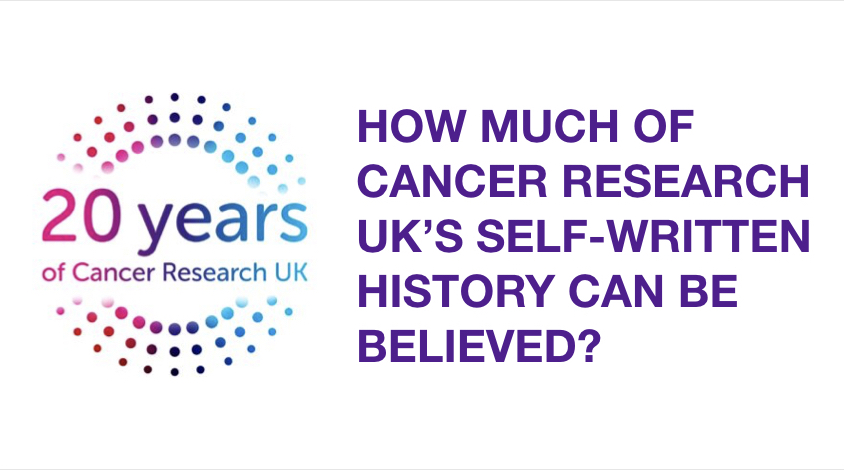
Last week Cancer Research UK celebrated their 20th Anniversary as a ‘brand’ (following the merger of two older cancer charities).
Social media and the airwaves were filled with stories of the charity’s history, its impact, and the big questions that will shape its future.
And yet, the questions which should be asked weren’t; how many of these tales can be believed? How much of the charity’s last twenty years (and the years preceding that) are works of fiction?
Cancer Research UK, its CEO Michelle Mitchell, and many others within the organisation (including its Trustees), are fully aware that at least one key part of the charity’s history is made up. And that must cast doubt on other elements of its reported history. Where there is one big lie, there are likely to be others.
Cancer Research UK, and its predecessor the Imperial Cancer Research Fund, have rewritten the history of the Race For Life to exclude Jim Cowan, the person who actually created it, and then spent the next 27 years spreading different fictional versions (i.e. lies).
We must therefore pose the question; how can anyone know for sure that they haven’t rewritten other parts of their story?
Mitchell might claim that she knows nothing of this rewriting of history, although as CEO she should avail herself of the facts. And, of course, she has had that opportunity but declined it.
In the past the very weak defence was that they had no documentation from the event’s creation.
But that doesn’t hold water. Firstly because of the numerous fictional versions they have relayed over the years; on what were they based? Secondly, because we have offered (on more than one occasion) to sit down and share documents and witness contacts with Mitchell but she was not interested. Evidence that clearly proves Jim Cowan created the Race For Life and that Cancer Research UK have peddled nothing more than a series of lies over the intervening years.
In short, they know they are not telling the truth but prefer not to correct the lie; they prefer fiction to truth. How can they then talk about Cancer Research UK’s history when, clearly, they don’t even care whether parts of it are even accurate? And if one part of that story is told while known to be false, which other parts of the story require (politely) closer examination?
Cancer Research UK and its CEO Michelle Mitchell have declined the opportunity to see documentation and to speak to witnesses who can confirm the correct story of the creation of the Race for Life.
They prefer a heads in the sand, ignore any facts we don’t like approach.
Surely, therefore, as well as the accuracy of its history, another big question that has implications for the organisation’s future, is that of whether it can be trusted?
With a track record of rewriting history, lies, hypocrisy, turning a blind eye to fraud, low integrity, poor ethics, and absent morals, we certainly would not trust them. But they could very quickly make a start on repairing the damage by recognising Jim Cowan, putting the record straight on their employee fraud, and acknowledging the many wrongs done in the last quarter of a century.
In the Race 4 Truth, Cancer Research UK are lagging behind.
NOTE: We should add that we also know that the Race for Life’s creator, Jim Cowan, has offered to sit down with Mitchell and her predecessor (Harpal Kumar) on more than one occasion, but she (and he) declined that offer too. It appears that historical accuracy, and with it trust, are not high up Cancer Research UK’s list of priorities.
